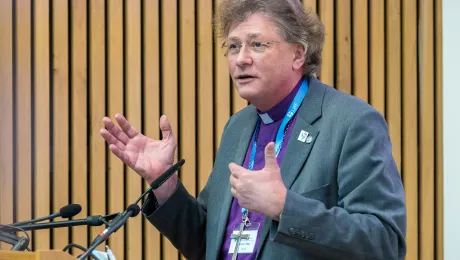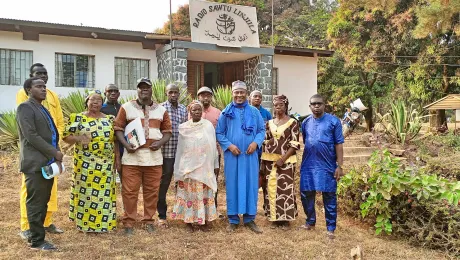
At Château de Bossey, near Geneva: participants at the December 2024 LWF Gender Justice Consultation make notes about their journey for gender justice. Photo: LWF/Albin Hillert
Online classes for first cohort of 25 participants
(LWI) - The Lutheran World Federation (LWF) has extended its annual training program on Theology, Gender Justice, and Leadership Education (TGLE) to its member churches in Asia. The inaugural cohort of 25 participants from LWF member churches in the region convened online, 16 December 2024.
The initiative, in partnership with the Sabah Theological Seminary in Malaysia, is funded through LWF’s Hélène Ralivao Fund, named after a prominent advocate for women’s rights in Madagascar. It adapts lessons from the initial African program to meet Asia's unique cultural and social challenges.
The training includes online coursework, individual mentoring, and an in-person session in July 2025. Also, participants will apply the knowledge and skills gained to implement small-scale projects in their respective churches, culminating in an evaluation workshop at the end of the year. One of the modules is structured around the LWF Gender Justice Policy (GJP), which member churches in the region have translated into several languages including: Arabic (Holy Land), Bahasa (Indonesia) Hindi, Tamil and Telugu (India), Korean (Korea), Thai (Thailand) in efforts to make it more accessible to congregations.
Apply the lessons you will learn to your local contexts and mentor others. This is how the LWF reaches the grass roots.
Rev. Dr Rospita Siahaan, LWF Regional Secretary for Asia
Welcoming participants, LWF Regional Secretary for Asia Rev. Dr Rospita Siahaan emphasized the communion’s commitment to promoting inclusive leadership in churches “as we are liberated by God’s grace and called to serve.” She reminded the member church representatives that they “are all ambassadors of the Lutheran communion,” and encouraged them to apply the lessons you will learn to their “local contexts and mentor others. This is how the LWF reaches the grass roots.”
Challenging norms and traditions
Introducing the GJP, Rev. Selma Chen, President of the Lutheran Church of Taiwan highlighted the theological foundation of the training program. The TGLE initiative is an opportunity to critically interpret scripture by, asking, “Do we read the Bible in ways that sustain harmful traditions, or do we challenge patriarchal norms in our churches?”
Chen, who in January 2023 became the first woman to lead a Lutheran church in her country, underlined the LWF policy as an instrument to achieve gender equality through contextualized measures that promote justice and dignity and meaningful participation. She affirmed LWF’s requirement of equal male and female representation of 40 percent and 20 percent youth in its events, despite challenges in achieving this goal at the local level. “It’s not just about fulfilling the quota but also giving the person the authority to make sure they can have meaningful participation in all kinds of activities and situations,” she explained.
She highlighted some milestones of gender justice work in the region to affirm and encourage churches to continue their commitment: the 2022 ordination of Rev. Sally Azar as the first Palestinian woman pastor in the Holy Land; translation of the GJP in three languages in India and celebrating 30 years of women’s ordination; and the important work being done by the women’s desk in various churches. “We are so blessed, we have so much to share, but we want to challenge the churches, and also ourselves,” to reflect on what contextualizing theological education means for Asia’s “very diverse and very colorful” context. “Is the work done after ordination, for example?” she asked.
Strengthening capacity
Mayuko Yasuda, Japan Evangelical Lutheran Church (JELC), referred to the TGLE initiative in Asia as a transformative journey. She shared how her first experience of women taking initiative and leadership at the LWF 2014 regional Women in Church and Society (WICAS) workshop in Malaysia evoked awareness about her context and the beginning of her gender justice journey. Despite having been “almost always one of the few women in leadership spaces” in JELC, “seeing women exercising their power and wisdom and knowledge so freely and actively and passionately was mind-blowing.”
Yasuda noted that when the National Council of Churches in Japan to which JELC belongs passed its own gender justice policy in 2024, the LWF policy was referenced “to learn what is important and what is lacking, so we know what to include.
Promoting gender justice for all enables us to use our God-given talents and gifts for the betterment of our churches and communities.
Rev. Ngui Au Sze, Vice Principal, Sabah Theological Seminary, Malaysia
STS Vice Principal Rev. Ngui Au Sze said she was excited to be part of the new initiative that will significantly contribute to “strengthening the capacity of women for the top echelon of leadership in the church in this region.” “Promoting gender justice for all enables us to use our God-given talents and gifts for the betterment of our churches and communities.”
Rev. Katariina Kiilunen, LWF Program Executive for Capacity Building and Leadership Development emphasized that "for us as Lutherans, gender justice is a matter of faith." She encouraged participants to view this program as an invitation to advance gender-just relations, theologies, and inclusive churches within the LWF communion.
The TGLE program is funded through the Hélène Ralivao Fund. LWF established the fund in June 2021 as a legacy to the Malagasy Lutheran Church theologian after whom it is named, for her dedicated service to the church and to women’s theological education and leadership in her home country Madagascar and beyond.


